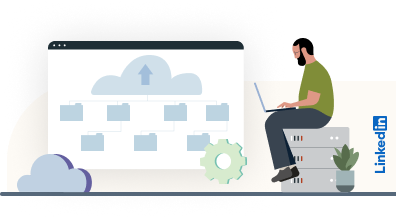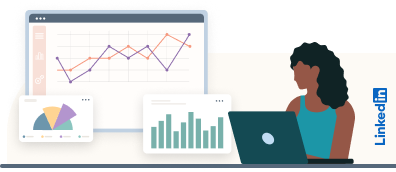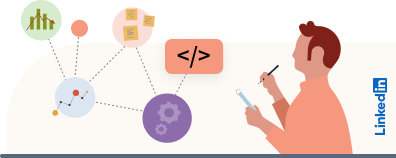

Data science is the science of modern business. In our latest Workplace Learning Report, data analysis skills were in the top ten most sought after skills for management, finance, and IT functions.
But most organizations are taking in so much data that it’s challenging to know what data is valuable and how to analyze it efficiently. That’s where artificial intelligence (AI) can make a substantial difference.
In this guide we’ll explore how AI turbocharges data science, giving it the power to crunch numbers, make predictions, and even automate tasks. We’ll also look at the skills your team needs in order to make the best use of AI in data science and how to develop them.
What to learn:

Real-world examples of AI-powered data science applications
Here are just a few ways that AI is helping to power up data science:
Healthcare:
Predictive Analytics for Patient Outcomes: AI-driven models analyze a patient's medical history, genetic information, and other relevant data to predict potential health issues. This allows healthcare professionals to intervene early, providing personalized care and potentially saving lives.
Medical Imaging and Diagnostics: AI is being used to analyze medical images like X-rays, MRIs, and CT scans. These algorithms can detect anomalies, assist in diagnosing conditions, and even identify early-stage cancers that might be missed by the human eye.
Finance:
Fraud Detection: AI algorithms monitor financial transactions in real-time, identifying suspicious activities and patterns indicative of fraud. This rapid response helps prevent unauthorized transactions and protects both businesses and consumers.
Algorithmic Trading: AI-powered trading systems analyze vast amounts of financial data to make split-second decisions on buying and selling stocks. These systems can react to market changes far faster than any human trader, potentially maximizing profits.
Marketing and E-commerce:
Personalized Recommendations: AI algorithms analyze user behavior and preferences to suggest products or content tailored to individual tastes. This enhances user experience, increases engagement, and drives higher conversion rates.
Sentiment Analysis: AI can sift through vast amounts of customer reviews, social media comments, and feedback to gauge public sentiment about a product, brand, or service. This information is invaluable for refining marketing strategies and addressing customer concerns.
These examples demonstrate how AI-powered data science applications are not only transforming industries but also improving the quality of services and products we rely on daily. It’s clear that the integration of AI into data science practices has far-reaching implications.

Statistical analysis and modeling
Mastering statistical techniques is a fundamental part of making sense of data. Skills to learn include understanding probability, hypothesis testing, regression analysis, and more. Developing these techniques gives you a toolkit for uncovering insights and drawing meaningful conclusions.

Data wrangling and cleaning
Before any meaningful analysis can occur, data often needs to be cleaned and prepared. This involves handling missing values, dealing with outliers, and ensuring consistency in the dataset. It's the foundation that ensures accurate and reliable results.

Data visualization
Being able to communicate insights effectively is key. Data visualization turns raw numbers into compelling visuals, making complex information easily understandable. It's like painting a vivid picture of the story hidden within the data.

Programming
Proficiency in programming languages like Python, R, or Julia is essential. These languages are the backbone of building AI models and conducting advanced analyses.

Understanding of algorithms and models
Knowing the ins and outs of different algorithms (e.g., decision trees, neural networks) and models will provide you with a vast array of techniques for approaching different types of problems.

Familiarity with machine learning frameworks
Tools like TensorFlow, PyTorch, and Scikit-Learn provide a structured environment for developing and deploying machine learning models. Familiarity with these frameworks is akin to knowing how to assemble and operate powerful machinery.
Network and ain practical experience
Join Professional Communities and Forums
Engage with communities like Stack Overflow, Reddit's r/datascience, and LinkedIn groups focused on Data Science and AI. These platforms are treasure troves of knowledge and networking opportunities.
Attending Meetups, Conferences, and Workshops
Connecting with professionals in person (or virtually) can open doors to collaborations, mentorships, and job opportunities. Events like conferences and meetups provide a platform for networking and learning from industry experts.
Participate in Hackathons and Competitions
Engaging in hackathons and competitions not only hones your skills but also exposes you to industry-relevant challenges. It's a chance to demonstrate your abilities and potentially catch the eye of prospective employers.
Keep learning to stay updated with industry trends and technologies
The current state of data science and AI is constantly evolving. Staying on top of the latest trends, tools, and techniques is crucial for maintaining a competitive edge. Encourage your team to take courses, follow industry blogs, subscribe to relevant newsletters, and participate in online forums to keep their knowledge up-to-date.
Remember, building a successful career in Data Science and AI is not just about technical proficiency; it's also about networking, staying curious, and being adaptable in the face of rapid technological advancements.



















